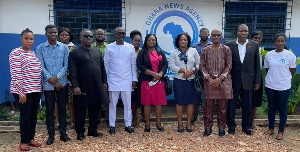Health News of Monday, 25 October 2021
Source: GNA
AIDS/STI Control Programme continues to provide free Antiretroviral Therapy
Dr Stephen Ayisi Addo, Programmes Manager, National AIDS/STI Control Programme (NACP) of the Ghana Health Service says the Programme continues to provide free Anti-Retroviral Therapy (ART) with the availability of sufficient drugs for the treatment of persons living with HIV.
He said Anti-Retroviral drugs were free, as the Government of Ghana and other partners continued to purchase the medication to ensure its accessibility throughout the country, which he said was one the core mandates of the Progreamme.
Dr. Ayisi Addo, speaking at the seventh Ghana News Agency Tema Regional Office Stakeholder Engagement and Worker’s Appreciation Seminar,” said all the persons living with HIV were part of an organised group - the National Association of Persons Living with HIV (NAP+) - which represented their interest.
The GNA Stakeholder Engagement is a platform rolled out for state and non-state actors to address national issues and serves as a motivational mechanism to recognize the editorial contribution of reporters towards national development in general, growth and promotion of GNA as the industrial news hub.
According to the Programmes Manager, the Ghana Health Service provided treatment to persons living with HIV and had over 500 antiretroviral sites across all districts in the country, providing treatment for persons living with HIV and over 4,000 testing and counselling service delivery sites for the general population.
He explained that most persons living with the virus have had to be offered treatment in district Hospitals stressing that, in addition to the work of service providers, some members of the NAP+, served as Models of Hope provided peer support and facilitated drug pick-up in ART sites.
He said the programme prioritized monitoring and evaluation of the stock level of antiretroviral drugs, adding that, monthly stock reports received from the Central and Regional medical stores also provided regular and timely updates of available drugs at the national level and regional facilities with an assurance of quality supply of medications.
According to him: “We also conduct quality assurance and post-market surveillance for these commodities to ensure that people are taking the right medications,” emphasising that, intermittently, education was reinforced with ARV Logistic Management training for service providers offering those services.
Dr Ayisi Addo, observed that despite the effort to bring the service closer to the people, they preferred to access their medications at other distant sites because of stigma and discrimination.
He noted that such persons preferred to travel long distances to receive Antiretroviral Therapy despite the associated cost and inconvenience, and said an enhanced education on stigma and discrimination was needed to change the trend.
The Programmes Manager called on the public to support persons living with HIV and encourage them to seek treatment at designated sites closest to them.
Mr Francis Ameyibor, Tema Regional Manager of the Ghana News Agency, in his welcome address, said the GNA stakeholder engagement has been created to offer the platform for state and non-state actors to interact with journalists and address national issues.
Entertainment










